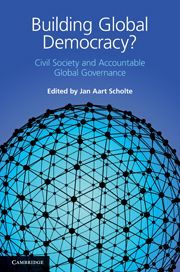Book contents
- Frontmatter
- Contents
- List of figures
- Participants in the Gothenburg Workshop
- List of contributors
- Editor's acknowledgements
- List of abbreviations
- Introduction
- 1 Global governance, accountability and civil society
- 2 Civil society and accountability of the United Nations
- 3 The World Bank and democratic accountability: the role of civil society
- 4 Civil society and IMF accountability
- 5 Civil society and the WTO: contesting accountability
- 6 Civil society and accountability in the Commonwealth
- 7 The Organisation of the Islamic Conference: accountability and civil society
- 8 Civil society and patterns of accountability in the OECD
- 9 Civil society and G8 accountability
- 10 Structuring accountability: civil society and the Asia-Europe Meeting
- 11 Civil society and accountability in the global governance of climate change
- 12 Civil society and accountability promotion in the Global Fund
- 13 Accountability in private global governance: ICANN and civil society
- 14 Civil society and the World Fair Trade Organization: developing responsive accountability
- Conclusion
- Bibliography
- Index
6 - Civil society and accountability in the Commonwealth
Published online by Cambridge University Press: 05 June 2012
- Frontmatter
- Contents
- List of figures
- Participants in the Gothenburg Workshop
- List of contributors
- Editor's acknowledgements
- List of abbreviations
- Introduction
- 1 Global governance, accountability and civil society
- 2 Civil society and accountability of the United Nations
- 3 The World Bank and democratic accountability: the role of civil society
- 4 Civil society and IMF accountability
- 5 Civil society and the WTO: contesting accountability
- 6 Civil society and accountability in the Commonwealth
- 7 The Organisation of the Islamic Conference: accountability and civil society
- 8 Civil society and patterns of accountability in the OECD
- 9 Civil society and G8 accountability
- 10 Structuring accountability: civil society and the Asia-Europe Meeting
- 11 Civil society and accountability in the global governance of climate change
- 12 Civil society and accountability promotion in the Global Fund
- 13 Accountability in private global governance: ICANN and civil society
- 14 Civil society and the World Fair Trade Organization: developing responsive accountability
- Conclusion
- Bibliography
- Index
Summary
Introduction
The Commonwealth presents quite a distinctive instance of global governance. It is ‘global’ in the sense that it draws participating governments and non-governmental groups from multiple regions and highly diverse economic and cultural contexts scattered across the planet. However, in contrast to the global institutions discussed in the preceding four chapters, the Commonwealth does not aspire to, and falls far short of, universal membership of all countries. It mostly links former territories of the British Empire, which often have broadly similar arrangements for education, law, mass media, medicine and government, as well as shared cultures of literature and sport. In addition, nearly all member countries of the Commonwealth share English, the principal global lingua franca, as an official language.
The Anglophone Commonwealth bears broad similarities with the Organisation Internationale de la Francophonie (International Organisation of La Francophonie), which groups governments of fifty-six French-speaking countries, and the smaller Comunidade dos Países de Língua Portuguesa (CPLP) (Community of Portuguese Language Countries), which assembles eight Lusophone states. The Commonwealth and La Francophonie have comprehensive mandates, including development issues, while the CPLP is more narrowly focused on matters of culture and education. Indeed, the formation of the CPLP in 1996 was in part a reaction to the accession of Mozambique to the Anglophone Commonwealth in 1995 (Shaw 2008: 24–7).
- Type
- Chapter
- Information
- Building Global Democracy?Civil Society and Accountable Global Governance, pp. 128 - 145Publisher: Cambridge University PressPrint publication year: 2011
- 2
- Cited by



